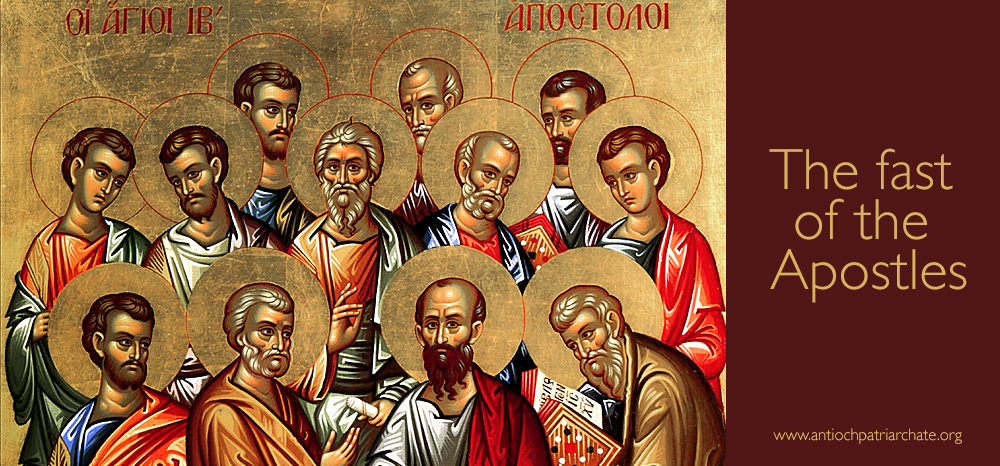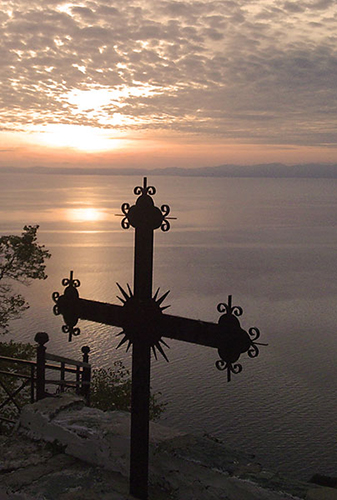
The Apostles’ Fast
The Apostles’ Fast
In one of his sermons, St. Basil the Great says, “Do not limit fasting to abstaining from food only, for real fasting lies in abstaining from evil acts, and to untie the bonds of injustice (Isaiah 58 :6 ).
During the fast, you do not eat meat, but unfortunately, you do eat the flesh of your brother. You do not drink wine, but you can’t control your tongue in order not to curse anyone. Despite the fact you spend the whole day without eating anything; yet, you spend your day judging others.
The Fast of the Apostles:
It has existed ever since the apostolic times. The apostles themselves exercised it while ministering the Lord (Acts 13:2). The church, in turn, has observed this fast and preserved it because it is included in her holy tradition and faith.![]()
This fast starts one week after Pentecost.
We read in the Apostolic Canons: “And you after celebrating Pentecost, feast one week, then start fasting, because it is necessary that we rejoice with the gift granted to us from God (the Holy Spirit), to fast after rejoicing.
This canon recalls the prophets who fasted like Moses and Elijah, and the three-week fast that Daniel the prophet exercised, the fast of Hannah the prophetess, the fast of the inhabitants of Nineveh, of Esther, Judith, and Prophet David. In the manner those people fasted, Christians have to fast. That is why the apostles wrote: “When you fast, ask for your needs from God.”
After venerating the holy apostles in the First Ecumenical Council (325), for being the teachers of true worship and the pastors of the whole world (oikoumeni), the holy fathers of the council called it “the fast of the Apostles”. They said that, a week after Pentecost, all Christians should abstain from meat, cheese, and all their derivatives all the days that follow that week till June 29 (the feast of the Apostles).
This apostolic decree has been well preserved by the community of St Saba’s monastery, St. John Damascene, St. Theodor the Studite, and other ancient fathers. Saints Basil the Great and John Chrysostom teach enough of this fast, and ardently adhere to it.
St. John Chrysostom in one of his sermons on the Holy Spirit reminds the Antiochian parishioners of this fast that is attributed to the holy apostles, and urges them to preserve it and observe it too.
The Four Yearly Fasts:
1- Great Lent. It starts 7 weeks before Pascha.
2- The fast of the Apostles. It starts on the eighth day after Pentecost, i.e., right after Sunday of All Saints, and ends on June 28, which is the eve of the feast of the Saints Peter and Paul. The period of this fast may range between one day and 6 weeks, depending on the date of Pascha. If this fast coincides with the feast directly, it is eliminated.
3- The Dormition fast. It lasts for two weeks (August 1 to August 14).
4- Nativity fast. Its duration is 40 days (November 15 to December 24).
5- In addition to these fasting periods, Christians fast every Wednesday and Friday, except during the interval between Christmas and Theophany (in some monasteries every Monday is a fasting period), Bright Week (the week that follows Pascha), and the week that follows Pentecost. The feast of the Exaltation of the precious and life-giving Cross, the beheading of St. John the Baptist, and the Preparation for Theophany are also fasting days.
Abstaining from Food:
Basically, it is the abstention from food till vespers, especially during Great Lent.
This abstention fast is prohibited on Saturdays and Sundays throughout the year, except on the Holy Saturday (one day before Pascha), for the Lord was still in the tomb.
The observance of fasting differs from one archdiocese to another. For example, a decree was issued at the Orthodox Patriarchate of Antioch during the Lebanese civil war by his Beatitude Ignatius Hazim to eliminate the fasting period between Pascha and Pentecost.
On Wednesdays and Fridays, the faithful should abstain from meat and cheese, unless it is a despotic feast like Christmas or the Divine Theophany.
Note:
Fasting is accompanied by prostrations (metanias). Whenever there is no fasting, there are also no- prostrations, like in the despotic and great feasts and during the 50-day period between Pascha and Pentecost, besides Saturdays and Sundays.
- Fasting before the Holy Communion:
We also fast before partaking the Holy Communion, i.e. before taking the holy body and blood of our Lord Jesus Christ. We abstain from food after a light supper (no meat supper) that follows Vespers before the Divine Liturgy on the next day. The goal of such a fast is only to show that we hunger for the life-giving Word of God. Those who have experienced this fast may know what it means and realize its results.
But when it is evening Liturgy as is the case in some feasts, we fast right after breakfast.
Some people speak of 6-hour fasting, the number of hours of the Lord’s suffering from the hour of his trial with being mocked at, scourged and smashed on the face. This is from 9 in the morning the hour of the trial till 3 in the afternoon, the hour of his death on the cross, knowing that he was put on the cross about noon.
Of course we may find some specific fasting periods accompanied by prayers and supplications, or as with priestly ordinations and so forth.








